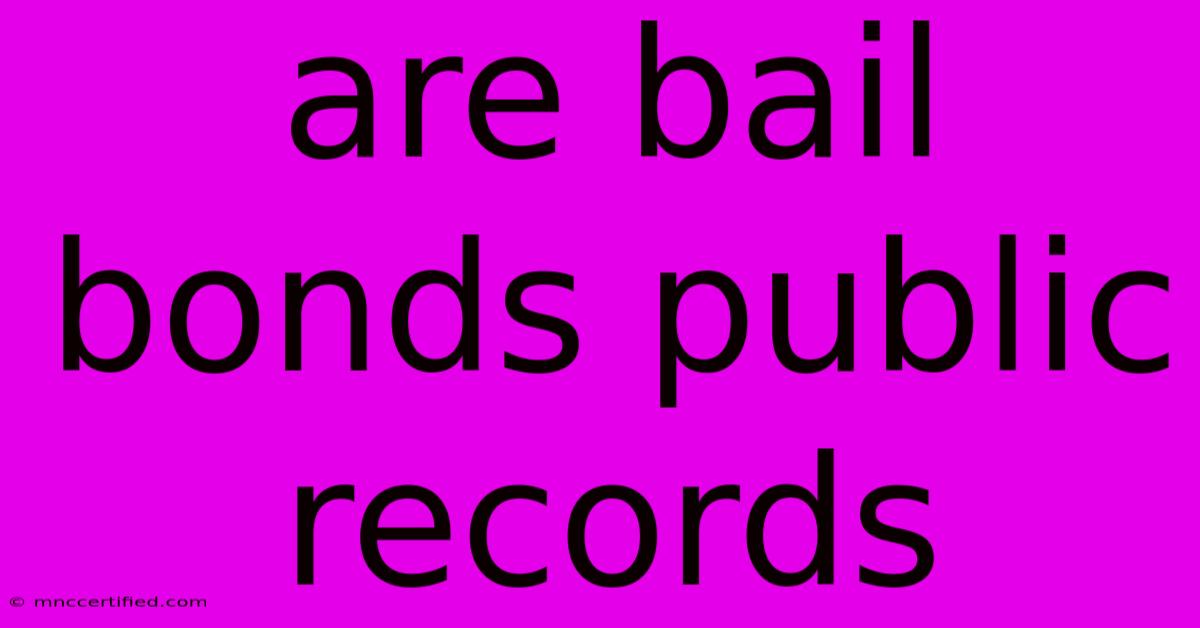Are Bail Bonds Public Records

Table of Contents
Are Bail Bonds Public Records? A Comprehensive Guide
The question of whether bail bonds are public records is a complex one, varying significantly by state and even by county within a state. While there's no single, nationwide answer, this guide will help you understand the intricacies of bail bond record accessibility and how to access them if they are public.
Understanding Bail Bonds and Public Records
Before diving into the specifics, let's clarify some key terms. A bail bond is a financial guarantee ensuring a defendant's appearance in court. A public record is information accessible to the general public, typically maintained by government entities. The intersection of these two concepts determines whether you can access information about specific bail bonds.
Many people search for bail bond information for various reasons, including:
- Background checks: Employers, landlords, or individuals may want to verify someone's past legal involvement.
- Research for journalistic purposes: Reporters may need access to such data for investigative stories.
- Personal interest: Family and friends might seek information about a loved one's legal proceedings.
State-Specific Laws Governing Bail Bond Accessibility
The key takeaway here is that there is no single federal law governing the public accessibility of bail bond records. Each state has its own laws, and within those states, counties may have differing regulations. Some states consider bail bond information part of the court's public record, freely accessible online or through a request. Others may restrict access, requiring court orders or specific justifications.
States with Relatively Open Access (Examples - Verify with the Specific County/Court):
Several states tend to have more open access policies, often making bail bond information available online through court websites or public record databases. However, even within these states, specific counties might have variations. It's crucial to check with the relevant county clerk's office or court system for precise details.
States with Restricted Access (Examples - Verify with the Specific County/Court):
In contrast, other states maintain stricter controls over bail bond records. Access might be limited to law enforcement, parties directly involved in the case, or those with a court order. Again, county-level variations exist, so direct verification is essential.
How to Access Bail Bond Records (If Publicly Available)
If your state and county allow public access, here's how you might obtain bail bond information:
- Online Court Databases: Many courts now offer online portals where you can search for case information, sometimes including bail bond details. Use the court's website or a state-level judicial website as a starting point.
- County Clerk's Office: This is the traditional route. Contact the county clerk's office in the jurisdiction where the bail bond was issued. They will likely have physical records and may be able to provide you with the information, sometimes for a small fee.
- Commercial Public Record Websites: Several private companies compile and sell public records data, including court information. Exercise caution when using these services, ensuring they are reputable and compliant with data privacy regulations.
Privacy Concerns and Ethical Considerations
Even when bail bond records are publicly available, remember that accessing and sharing such information carries ethical implications. Misusing this data could have legal consequences. Always consider the privacy rights of individuals involved and use the information responsibly.
Conclusion: Due Diligence is Key
Determining whether bail bonds are public records requires diligent research. Start by checking the website of the court or county clerk's office where the case originated. Remember that state and county laws vary considerably, and direct verification is essential to ensure you're following legal and ethical procedures. This guide provides a framework, but always confirm the specifics relevant to your situation before proceeding.

Thank you for visiting our website wich cover about Are Bail Bonds Public Records. We hope the information provided has been useful to you. Feel free to contact us if you have any questions or need further assistance. See you next time and dont miss to bookmark.
Featured Posts
-
Bond No 9 Tribeca Travel Size
Nov 28, 2024
-
Classic Car Insurance Arizona
Nov 28, 2024
-
Train Cancellations Due To Storm Conall Warning
Nov 28, 2024
-
Groucho Club Sohos Famous Club Closes
Nov 28, 2024
-
Radiologist Workforce 984 M On Certs
Nov 28, 2024